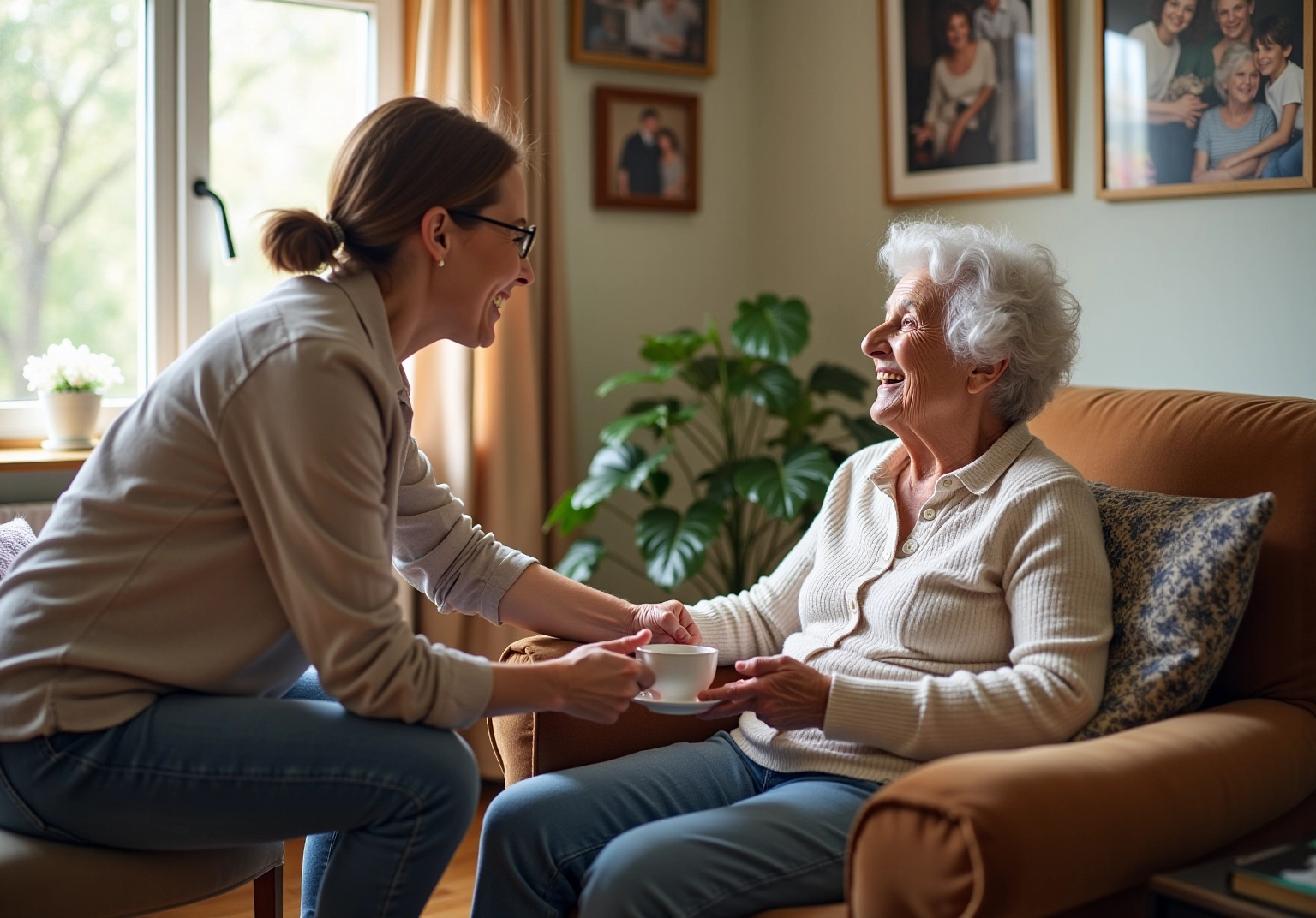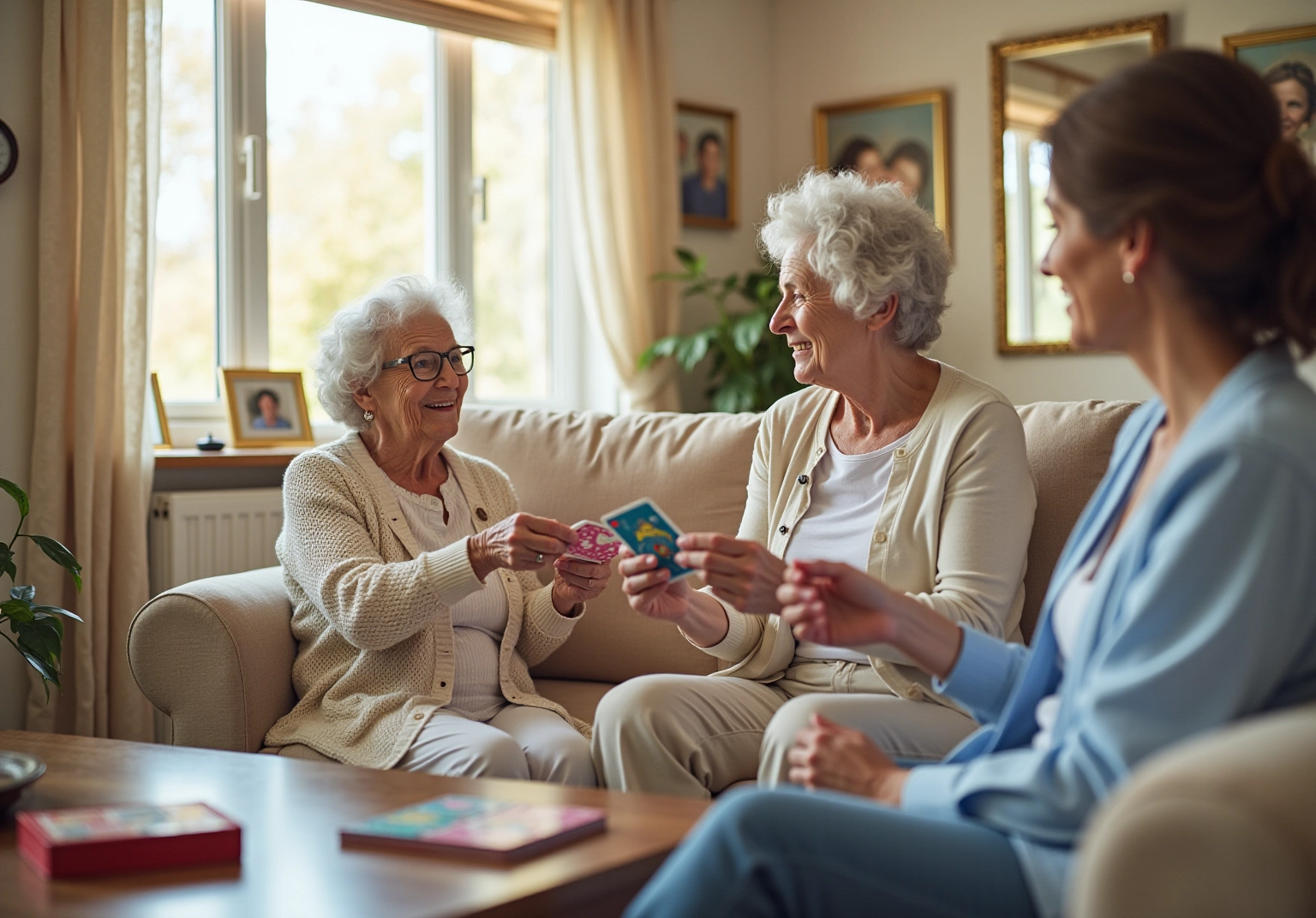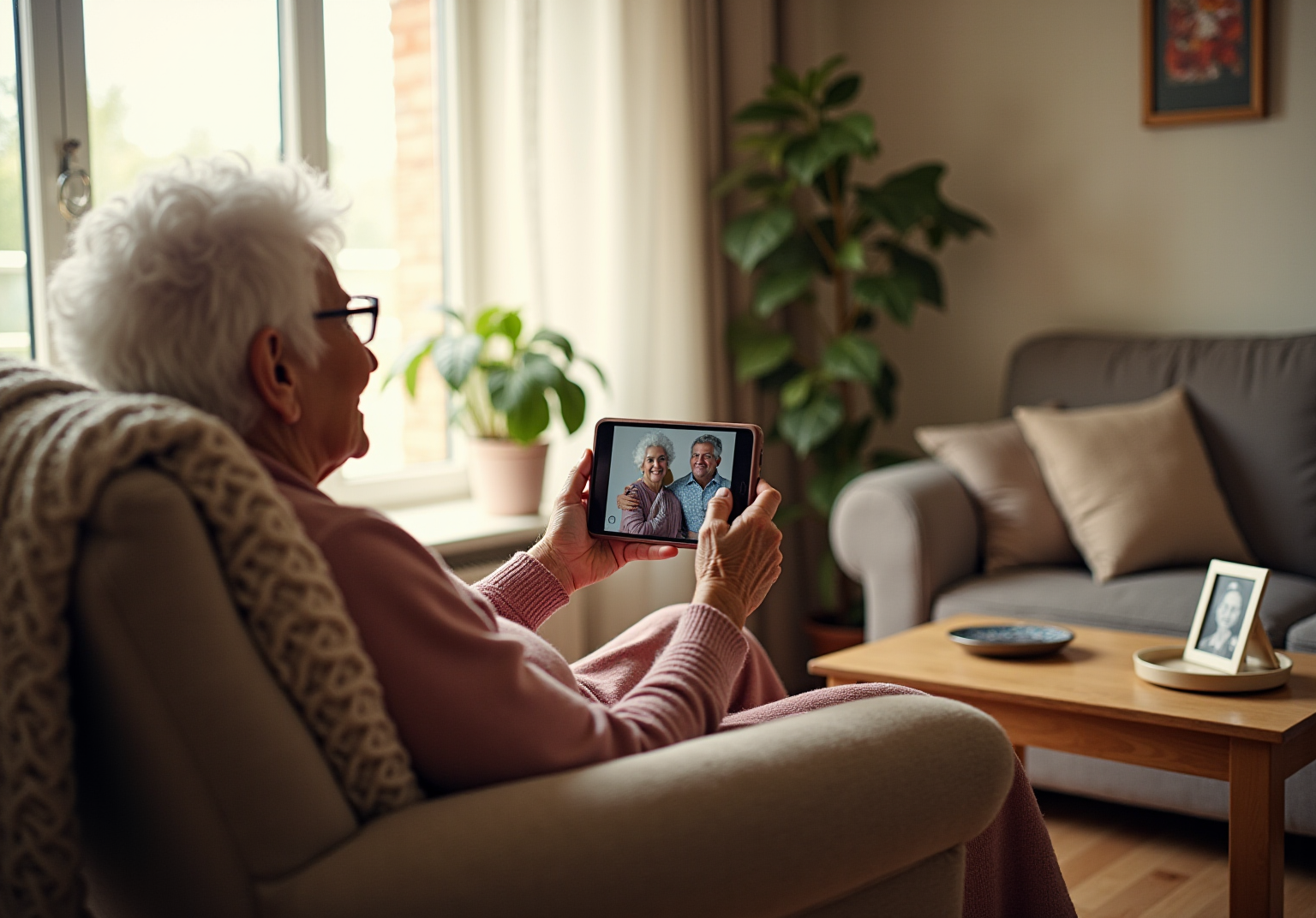Overview
The article highlights four essential practices for providing elderly help at home, focusing on home safety, personal care, companionship, and collaboration with healthcare professionals. These practices are vital for enhancing the quality of life for seniors, as they address safety concerns, promote independence, foster social engagement, and ensure comprehensive care through effective teamwork among caregivers and healthcare providers.
In addition, by prioritizing home safety, we create a secure environment where seniors can thrive. Personal care not only meets their physical needs but also nurtures their dignity and self-esteem. Companionship plays a crucial role in combating loneliness, allowing seniors to feel valued and connected. Furthermore, collaborating with healthcare professionals ensures that all aspects of a senior’s well-being are taken into account, leading to more effective and personalized care.
Ultimately, these practices collectively enhance the lives of our elderly loved ones. We understand the challenges you face, and we’re here to support you every step of the way. Your comfort is our priority, and together, we can create a nurturing environment that promotes independence and joy for seniors.
Introduction
Creating a nurturing environment for seniors at home is not merely about comfort; it is essential for their overall well-being. As families navigate the complexities of elderly care, it is crucial to understand the practices that enhance safety, personal care, and social engagement.
What occurs when the needs of elderly individuals remain unaddressed? How can caregivers effectively bridge the gap between independence and support? This article explores four critical practices that ensure seniors receive the assistance they deserve, fostering a secure and fulfilling living experience.
We’re here to guide you through this journey, ensuring that your loved ones feel valued and cared for.
Establish Home Safety and Comfort for Seniors
Creating a safe and comfortable home for seniors with the assistance of elderly help begins with understanding their unique needs and concerns. Start by assessing potential hazards and their overall health status. It’s crucial to remove tripping hazards like loose rugs and clutter, ensuring that all areas are well-lit—especially stairways and hallways. Installing grab bars in bathrooms and non-slip mats in showers can significantly prevent falls, giving you peace of mind.
In addition, consider incorporating voice-activated lights and automated medication dispensers to enhance accessibility and independence. As you evaluate your elderly relative’s needs, observe their ability to perform daily activities such as personal hygiene, dressing, cooking, and managing medications. If you notice challenges in these areas, it may be time to consider elderly help through CNA/HHA caregiver services.
Health issues like managing chronic conditions, frequent hospitalizations, or recent surgeries that require ongoing support are also important factors to consider. Regular safety inspections can help maintain a secure environment, adjusting as the individual’s needs evolve over time. Remember, transparent communication with caregivers and regular updates can ensure high-quality elderly help and swiftly address any issues.
Your loved one deserves a nurturing environment where their comfort is a priority. We’re here for you, ready to assist in creating a safe haven that fosters independence and well-being.
Assist with Personal Care and Daily Activities
Providing elderly help with personal care is vital for their overall well-being. This includes helping with activities of daily living (ADLs) such as:
- Bathing
- Dressing
- Grooming
- Meal preparation
Establishing a routine that honors the senior’s preferences while addressing their needs is crucial. For instance, encouraging independence by allowing them to select their outfits or meals fosters a sense of control and dignity. Utilizing adaptive tools, such as long-handled sponges or dressing aids, can facilitate self-care and enhance their ability to manage personal hygiene.
Prioritizing hydration and nutrition is equally essential. Those responsible for care should:
- Prepare balanced meals
- Encourage regular fluid intake to maintain health
Additionally, personal care routines serve as valuable opportunities for social interaction and emotional support. Regular check-ins on their emotional well-being can strengthen bonds and provide companionship, which is particularly important as nearly one-third of older adults report feelings of isolation. By integrating these practices, caregivers can provide essential elderly help to significantly improve the quality of life for elderly individuals, ensuring they feel respected, valued, and connected.
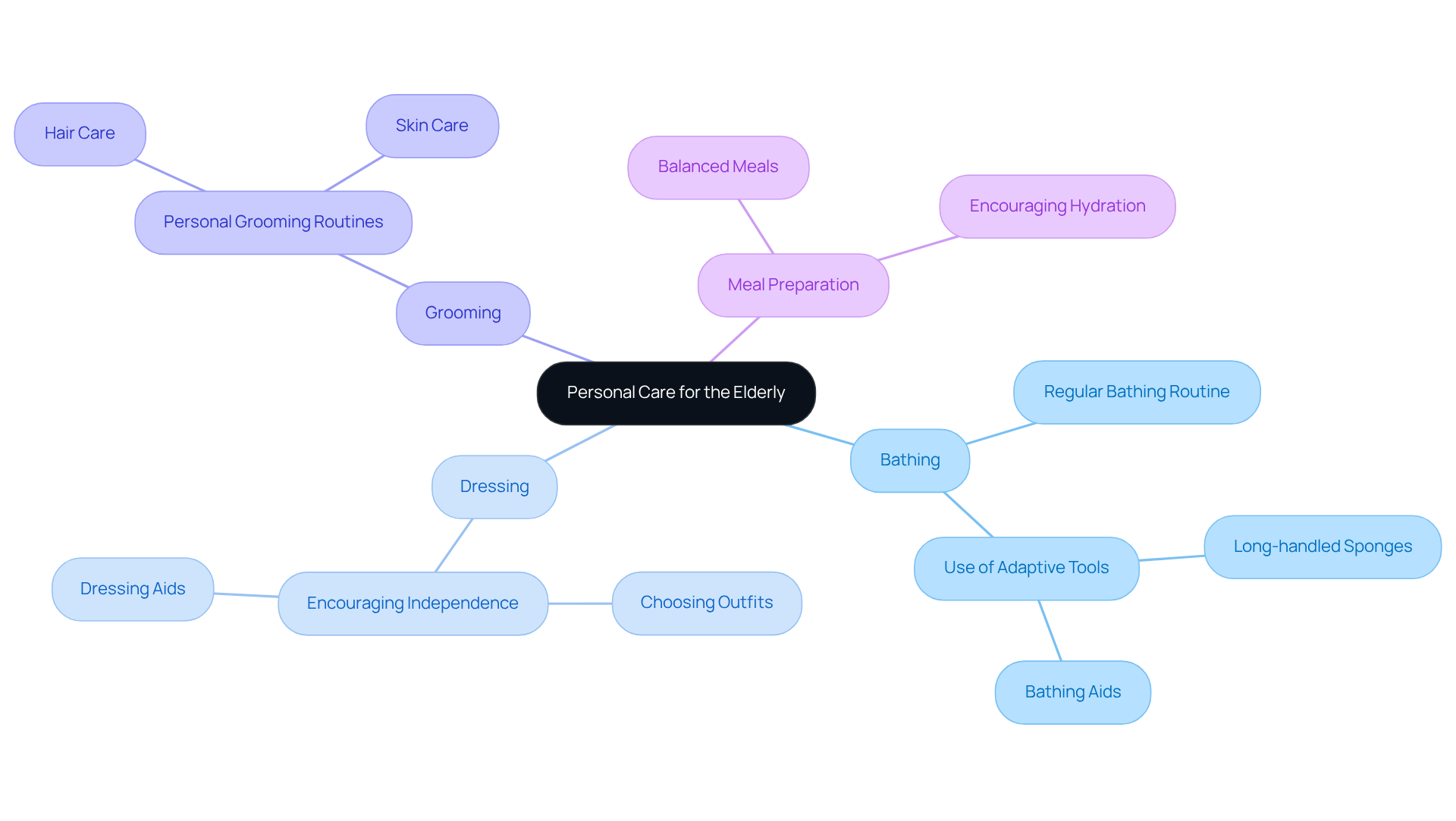
Provide Companionship and Social Engagement
To foster effective companionship and provide elderly help, it is essential to engage seniors in meaningful conversations and activities that resonate with their interests. Have you ever considered how encouraging participation in social events, whether virtual or in-person, can significantly enhance their connections with peers? Activities like playing games, gardening, or participating in community events not only offer enjoyment but also encourage social interaction, which is essential for mental well-being.
Furthermore, introducing technology that facilitates remote connections with family and friends can bridge the gap of isolation. Regular visits or scheduled calls can offer elderly help by maintaining these vital relationships, reducing feelings of loneliness and enhancing a sense of belonging. Given that approximately 20% of older adults experience mental health disorders, including depression and anxiety, these strategies for elderly help are vital for enhancing their quality of life and emotional well-being. Remember, your comfort is our priority, and we’re here to support you in nurturing these connections.
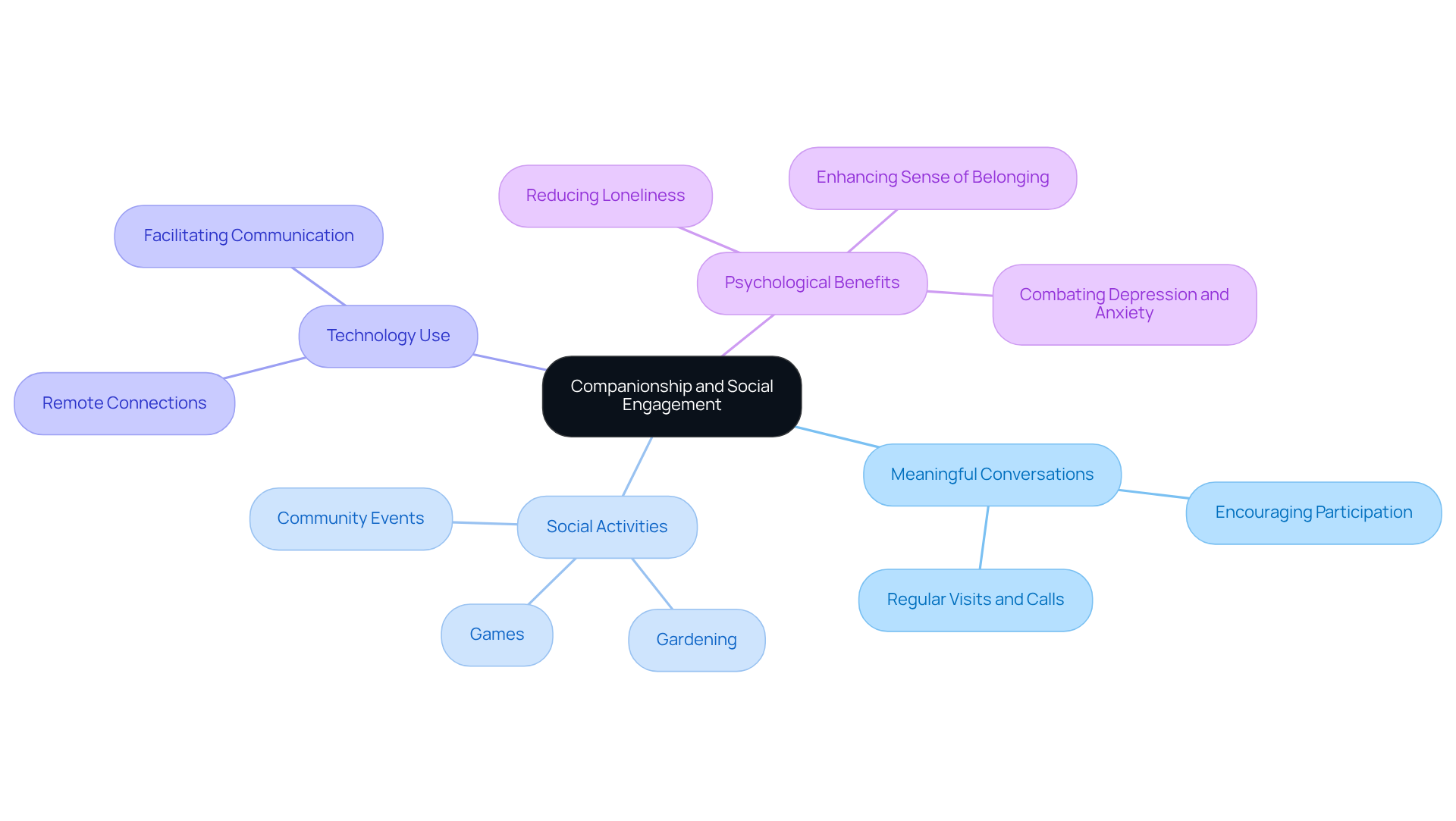
Collaborate with Healthcare Professionals for Comprehensive Care
Effective teamwork with healthcare experts is vital for providing comprehensive elderly help to individuals. By establishing a strong network that includes primary care physicians, specialists, and therapists, we can address the diverse needs of our seniors. Without elderly help from Certified Nursing Assistants (CNA) or Home Health Aides (HHA), elderly individuals may face significant challenges, such as:
- Deterioration from lack of monitoring
- Poor nutrition due to insufficient meal preparation
- Increased risk of social isolation
Routine examinations should be arranged, ensuring that all caregivers are informed about the elder’s well-being and any changes in their condition. Using coordination software can simplify the tracking of appointments, medications, and treatment plans, fostering a unified approach to support. This collaborative strategy not only enhances the quality of care but also provides elderly help by empowering families to actively participate in managing their loved one’s health, ultimately leading to improved health outcomes for older adults.
Furthermore, integrating CNA and HHA caregiver services into this collaboration can greatly enhance elderly help and improve the quality of life for older adults. Caregivers provide essential elderly help in:
- Personal hygiene
- Medication management
- Emotional companionship
These services are crucial for maintaining seniors’ independence and dignity. However, it is important to acknowledge that 46% of healthcare professionals report that their organizations lack a defined process for coordinating services, highlighting the ongoing challenges in this area.
In addition, insights from healthcare coordinators can further strengthen the case for effective collaboration. Their experiences can provide valuable perspectives on successful coordination models that have positively impacted elderly help and health outcomes. To explore personalized care solutions tailored to your needs, we’re here for you. Call Best Care Nurses Registry at (888) 203-2529 today.
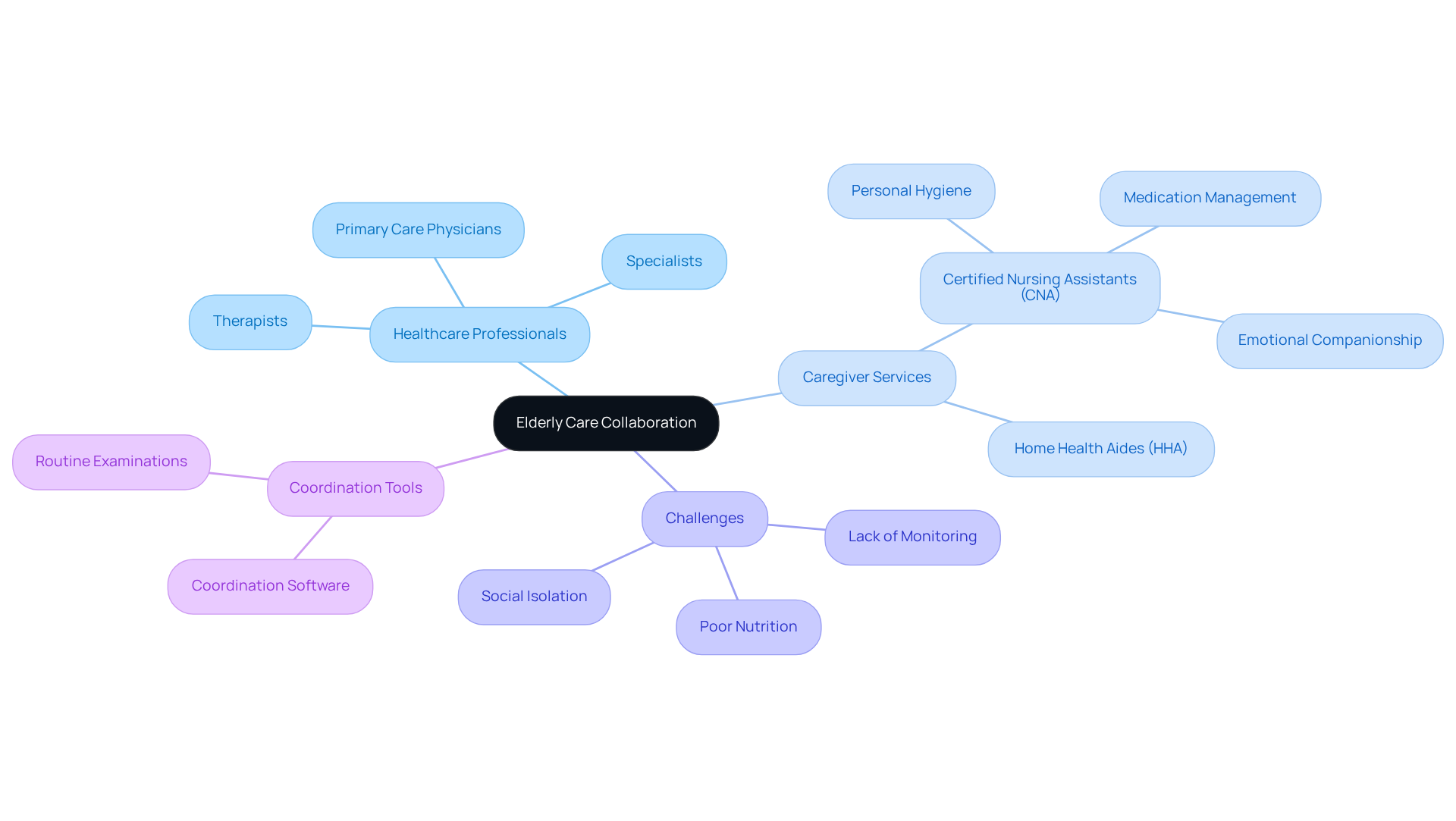
Conclusion
Creating a supportive and nurturing environment for seniors at home is essential for their overall well-being. We understand the unique needs of elderly individuals, and it is crucial to ensure they receive the assistance necessary to maintain their independence while enjoying a safe and fulfilling life.
Key points to consider include:
- Establishing home safety and comfort
- Assisting with personal care and daily activities
- Fostering companionship and social engagement
- Collaborating with healthcare professionals
Each of these elements plays a vital role in enhancing the quality of life for seniors, from improving physical safety to promoting emotional well-being through social connections.
Ultimately, we cannot overstate the significance of implementing these essential practices. By prioritizing safety, personal care, and social interaction, caregivers can create an environment where seniors feel respected, valued, and connected. It is vital to take action and explore personalized solutions that cater to the specific needs of your elderly loved ones, ensuring they thrive in their home environment.
Frequently Asked Questions
What is the first step in creating a safe home for seniors?
The first step is to assess potential hazards and the overall health status of the senior.
What specific hazards should be removed to enhance safety for seniors?
Tripping hazards such as loose rugs and clutter should be removed, and all areas should be well-lit, especially stairways and hallways.
How can grab bars and non-slip mats help seniors?
Installing grab bars in bathrooms and non-slip mats in showers can significantly prevent falls, enhancing safety.
What technological aids can improve accessibility for seniors?
Voice-activated lights and automated medication dispensers can enhance accessibility and independence for seniors.
What daily activities should be evaluated to determine the need for elderly help?
It is important to observe their ability to perform daily activities such as personal hygiene, dressing, cooking, and managing medications.
When should one consider hiring elderly help through caregiver services?
If seniors face challenges in daily activities or have health issues like managing chronic conditions, frequent hospitalizations, or recent surgeries, it may be time to consider hiring caregiver services.
Why are regular safety inspections important for seniors?
Regular safety inspections help maintain a secure environment and allow for adjustments as the individual’s needs evolve over time.
How can communication with caregivers impact the care of seniors?
Transparent communication with caregivers and regular updates can ensure high-quality elderly help and swiftly address any issues.
What is the ultimate goal in creating a home environment for seniors?
The goal is to create a nurturing environment where the comfort and well-being of the senior are prioritized, fostering independence.



